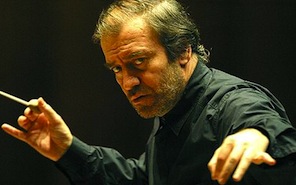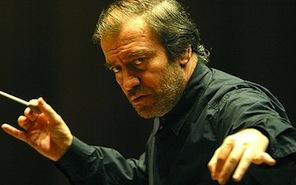
Sometimes you know it right away. The first few minutes of a performance, even the first few measures, can signal that something remarkable is in store.
And so it was Friday in Berkeley, when the Mariinsky Orchestra began its three-concert survey of Tchaikovsky’s six symphonies in a Cal Performances presentation at Zellerbach Hall. With the languid opening tremolos in the violins, the cellos’ first amber utterances, and burnished woodwind figures, the Mariinsky made the fanciful subtitle of the composer’s Symphony No. 1 in G Minor, “Winter Dreams,” a living, breathing, organic reality.
Many things can be said about how well this esteemed Russian ensemble, formerly known as the Kirov Orchestra, played under Music Director Valery Gergiev’s lead. Entrances and cutoffs were almost uncannily precise. The melodic lines were lush but taut, like stretched velvet. The string textures glittered like sunlit snow or abruptly darkened, casting long shadows over the musical landscape. The woodwinds, which shone all night, burbled and murmured and braided together into a single flowing stream. The horns lent a sense of warm interior space. The trumpets spoke up, when called on, like earnest, pure-voiced choirboys.
Yet the experience was not, as it sometimes is with a great orchestra, a procession of marvelous effects. What mattered, what made the exquisite moments and the four movements of this youthful work come together into a captivating whole, was the sense that the Mariinsky players meant everything they said — all of them meaning the same thing.
Restraint is often what tears the heart, as the Mariinsky demonstrated here.
Processing onstage together and performing on a predominantly flat floor, with only some low risers at the back, the orchestra presented a unified front. Gergiev stood with them, conducting without a podium. Everything the musicians played reinforced that impression of solidarity. The evening was full of rich orchestral color, just not the kind that flashes and dazzles and burns out. This was the aural equivalent of Old Master painting, where light and shade, tone and depth, are drawn together in an utterly persuasive, immersive way.
In the first movement of Tchaikovsky’s First, titled “Reveries of a Winter Journey,” Gergiev found a compelling narrative through-line. Instead of one melodic episode giving way to the next, a forceful sense of development emerged. Especially striking, in recollection of these travels, were the mournful, darkly accented intervals the cellos kept insisting that we notice along the way.
The Adagio, “Land of Desolation, Land of Mists,” was especially glorious. Those splendid woodwinds, decisive but never showily pungent, lyrical but never unctuous, spun out a tender little interlude over a murmurous string ground. Then, in seamless fashion, the woodwinds retreated as the strings took over one of this symphony’s many fetching, folk-inflected themes. Whenever the music verged toward heart-on-the-sleeve excess, Gergiev held it in check, using only the slightest hand quivers to signal his intentions. Restraint is often what tears the heart, as the Mariinsky demonstrated here. This breathtakingly beautiful movement alone made a case for this seldom-heard work, written when the composer was 26, then indifferently received and revised eight years later.
It’s all in the music, Gergiev seemed to be telling us. Just listen. Listen very closely.
Following a Scherzo that took the less-is-more principle perhaps half a step too far — a touch more dash and humor from the ensemble seemed in order — the Finale was a full-blooded marvel. There was momentum and drive, a cohesive gathering of thematic strands, a simultaneous sense of summing up and opening out into gleaming new vistas. Even the little caesuras of silence Gergiev worked into the fabric had a sense of inevitability. Yes, there are some overweening, melodramatic passages here and elsewhere in the piece. But what did it matter? The Mariinsky had everyone dreaming along with them.
The Call to Just Listen
By jumping from the lesser-known First Symphony to the ultra-familiar Symphony No. 6 in B Minor after intermission, the program risked a steep slide into a listener’s comfort zone. Gergiev snatched that presumption away immediately, by striding into the famous opening of the Pathétique with a brisk, almost brusque, assertion of the opening theme. It was a stark, startling call to attention.
And so it went from there, with the Mariinsky never pushing or pleading, never leaning or torquing a phrase too hard. It’s all in the music, Gergiev seemed to be telling us. Just listen. Listen very closely. Nothing made that point more eloquently than the clarinet’s pianissimo fade to near silence in the first movement.
In the sweetly stuttering waltzlike second movement, Gergiev declined the invitation to coyly flirt or seduce. The dotted rhythms were done in a stately way that made them all the more enticing, tinted ever so slightly with the grave doings to come. The third movement’s march was driven by an excitable, almost frantic energy, a centripetal force that threatened to pull the entire thing apart from inside. The strings rode their great downward swoons in near free fall. The brass snarled and keened. The percussion exulted madly.
Finally, reminding us where all this barely controlled chaos was headed, Gergiev tore straight into the final movement without a pause. The opening lament was every bit as assertive as the march. The sorrow was visceral, wrenching, unanswerable. The bassoon grieved in a painfully raw voice. Dissonances lingered in the air. The desolation was complete, enveloping, the final long notes an expiration.
Anyone who may have come into the weekend sniffing at an all-Tchaikovsky program was thoroughly disabused of any prefabricated assumptions. The Mariinsky amazed on multiple levels on its Zellerbach opening night. It made a relatively minor work sound substantial and tightly wrought. It scrubbed the varnish off a repertory standard. And it reversed the impression left by a previous visit, to Davies Symphony Hall in March, that its reputation exceeded musical results.
It did one more thing: It wanted to make you come back to Zellerbach right away and hear it again.

